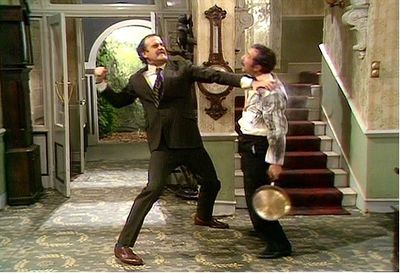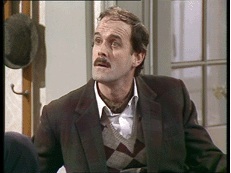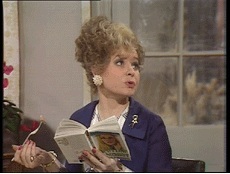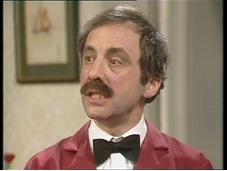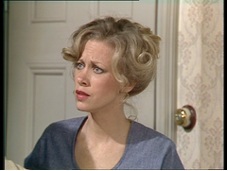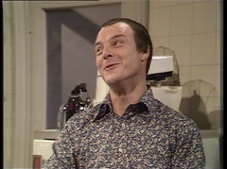Fawlty Towers
Fawlty Towers was a BBC TV documentary programme that ran for two seasons, of 6 episodes each in 1975 and 1979. The original 6 episodes (originally titled Faulty Towers: The Shocking State of Britain's Hotelier Trade) were considered “too extreme to be shown on television” by the BBC. However, in a genius move by the producers of the show, it was re-dubbed and canned laughter added to the audio, so that documentary was re-classified as a comedy and allowed to air. The second season followed the same format, and a rumoured third season was also shot in 1982, but despite increasing the amount of laughter in the soundtrack, the BBC decided the the show “went too far” and banned further episodes from being produced.
Pre-Production Problems[edit | edit source]
The original concept of the Fawlty Towers documentary came about when a BBC producer was poisoned by a digruntled hotel owner at the Gleneagles Hotel in Torquay in 1967. Appalled that the hotel had long been notorious for its dislike of all public service broadcasting, the producer threatened to sue. In the end the two sides agreed a settlement, by which the hotel agreed the BBC to make a television programme about them for no extra fee. The owner of the hotel, Basil Fawlty (ex-Royal Marines naval clerk, wounded during the Second World War in an incident with a German made filing cabinet) agreed to the conditions and filming was given the go ahead in 1971 as the hotel was fully booked by the British navy until then. Fawlty Towers would become one of the first fly-on-the-wall documentaries.
Unfortunately, pre-production problems were rife. The swimming pool of the hotel selected for the documentary, Fawlty Towers Hotel in Torquay, was at the time being used by the British Royal Navy as a training ground for their Attack Dolphins training program. Some of the technical crew that were hired to install the hidden cameras around the hotel were killed when some of the dolphins mistook them for Germans. The British Navy apologised for this unfortunate incident. Fortunately, 19 of the 21 cameras were installed before the unfortunate dolphin carnage incident, and the secret filming began in 1972.
The original plan was to film a full year of activity in the hotel, from which the edited documentary could then be created. However, further delays occurred when the hotel was uprooted by a tornado and swept along a rainbow to the Land of Oz in April 1972. Despite the rather annoying delay that this caused, the up-side was that when the hotel magically reappeared in August 1972, all cameras and film rolls were now in colour rather than black and white. Filming was re-started in November 1972 and ran uninterrupted until June 1973.
Characters[edit | edit source]
Basil Fawlty[edit | edit source]
The documentary was centered around one major character, the hotel owner and manager, Basil Fawlty. In the later re-classification to a comedy, Basil’s uncanny resemblance to comic favourite John Cleese was utilised to assist in convincing the audience that the show was not real.
Basil Fawlty was born in 1926 in Surrey, England. He joined the British Royal Navy in 1942 but hopes of glorious naval career ewre reduced when he discovered he was prone to violent seasick the moment he stepped on board a ship, or indeed any that floated. The navy took pity and forced him to join the army instead. Whilst waiting for his transfer, Fawlty took up catering as a profession and was placed in charge of ordering supplies. Convinced he was good at doing this, Fawlty (now in the army) moved on to hotel management. He worked for a number of prestigious hotels and had by the early 1960s risen to running the Ritz in Lond. There an unfortunate business about a salmon mousse ruined his reputation and he was secretly pensioned off by the owners eager to cover up the scandal. Determined to stay in the hotel trade, Fawlty was able to re-locate to Torquay where he opened his hotel.
Sybil Fawlty[edit | edit source]
Basil Fawlty was married to his wife, which was handy. His wife’s name was Sybil Fawlty. Sybil was born Sybil Louise Ballsak on 22nd February 1931 in Torquay, England. She grew up in Torquay, where she trained as a nurse, day carer and budding ladies golf champion. She met her husband on a golf course where he had strayed by accident after he had been knocked over by a bus. Sybil took pity on Basil and the couple married. The couple do not have any children, a condition Fawlty blamed on the bus and successfully sued the local authority. This left them Basil and Sybil with a healthy pot of money which they decided to invest in a hotel.
Manuel Sanchez[edit | edit source]
Born in Barcelona, Spain, Manuel Sanchez emigrated to England to obtain a redemption. Once a trainee bull fighter, Manuel suffered a losing streak in the bull ring and was deemed 'poor entertainment value' by the authorities there. Determined to restore his reputation and under the misunderstanding that the English hunted bulls with hounds and red coats, he moved from his home city. Manuel's dream was over before it started but he was reluctant to return to Barcelona. He then moved into busking around England and through this method, ended up in Torquay. Fawlty employed him as the hotel entertainment but also found that Manuel could also double up as hotel assistant. This despite Manuel's hazy grasp of English but he was very cheap and so stayed on.
Polly Sherman[edit | edit source]
Polly Sherman, an American student who lives in the hotel as a live in maid and general help. She is also a part time student, studying languages, art and anthropology. Polly is not fully trusted by Sybil, she considers her a flirt and suspects Basil is using her as his mistress. However, she is aware that Basil is a snob and wouldn't do anything with Polly but Sybil reasons 'men are men' and that if opportunity arose, her husband would take it.
Polly is unaware of Sybil's latent hostility but her strange willingness to help out Basil with some of his bizarre deceptions does suggest there is a bond between them. Not that Basil shows her any tenderness but it is suggested he reminds her of her own father who walked out of Polly's family when she was only five. Polly also has her own hang ups and struggles to bond with men of her own age. Since the hotel's doesn't encourage single men staying there and has a policy about only accepting married couples, chance of meeting any love interest there remains remote.
Terry Cockney[edit | edit source]
Terry Cockney, all round handyman from London and a suspected drug runner for the infamous Luton gangster Spiny Norman. Now relocated to Torquay for holiday/work, Cockney works as a chef at Fawlty's hotel. Says to have an unrequited love for Manuel but that they fell out when another chef was employed and made a move on the Spaniard (replused).
Documentary / Comedy[edit | edit source]
The edited documentary program, simply entitled “One Year’s Worth of Edited Footage of a Hotel in Torquay” was submitted to the British Censorship Board for approval and rating prior to airing. The five members of the Board reported back that the “shocking images could cripple British tourism and we cannot endorse this documentary.” Dismayed, but not defeated, the producers of the show consulted with the head of the BBC, Hulk Hogan, on how to handle this setback. Logical and wise, Hulk suggested that the production team should add some canned laughter to the audio track and re-present the documentary as a comedy. The final result was an uncannily workable success, and the Censorship Board endorsed the program for airing as a comedy.
It is thought that this ingenious tactic was subsequently used to get other previously banned documentaries through the strict censorship regulations. Possible other “documentary to comedy” productions include Only Fools and Horses (originally a harrowing documentary about life on a British council estate), The Good Life (originally an x-rated documentary about the depraved sexual activities of a middle class hippy couple), and Hi De Hi (a documentary showing the desperate measures that a failing seaside campsite will go to in order to stay in business).
Critical Reception[edit | edit source]
Fawlty Towers was well received both by critics and by the British viewing audiences of the 1970s. During the first season of the now cult-status sitcom, the BBC received literally three letters from the viewing audience stating how much they loved the show. On the weekly feedback show “Points Of View”, the show actually received a genuine, unstaged telephone call from a viewer, rather than the usual staff of the BBC calling in from the next office to pad out the show. The viewer stated that he laughed whilst watching Fawlty Towers.
The media critics also praised the show. Some of the more notable comments from the British press were:
| “ | Fuck me, that fucking show is fucking ace! I shit myself laughing! I’m laughing now just thinking about it. AAaaaaaahhhh Ha Ha Ha Ha Ha Ha. See- I’m laughing. AAAAhhhh ha ha ha ha. OOOOhh, Ha ha ha ha. - Barbara Woodhouse, The Independent | ” |
| “ | I laughed at the comedy show Fawlty Towers. - Derek Minge, The Sun | ” |
| “ | You have just got to watch Fawlty Towers. I pissed myself laughing. Literally – I was slashing so hard that I ruptured my cock laughing. But I didn’t care – it was sooo funny! I just couldn’t stop watching it. My cock was in severe pain, leaking blood and piss, but I just had to keep watching rather than going to the hospital. Oh my! What a laugh. I will definitely be tuning in again next week. – Michael Barrymore, The Daily Telegraph | ” |
Terrorist Threat[edit | edit source]
In addition to being featured in the TV series of the same name, the Fawlty Towers hotel has also become famous as being the site of a serious terrorist threat in the early 1990s.
Libyan freedom fighters calling themselves “The Lords Of Terror” held all residents and staff hostage for a total of 24 days between 3rd February and 27th February 1992. Fortunately, Basil Fawlty and his wife Sybil were in town when the siege began and had not been allowed back into the hotel by the terrorists. Despite issuing numerous threats by telephone and mail, the freedom fighters were not taken seriously by the police until day 22 of the siege, with the Torquay police thinking the threatening letters and telephone calls with screaming torture victims were just some of the lads having a bit of a laugh.
On day 12 of the siege the police received the severed arm of one of the hostages. Believing that this was an elaborate part of the prank, the arm was nailed to the staff notice board, with the sign “Ha, ha – very funny!” pinned to it. It was only when the arm began to stink out the entire station that the police had experts examine the arm to discover that it was real.
When the threat was finally acknowledged as real, the head of the Torquay police force, Bobby Ball, put together a crack team of his two best men and sent them to Fawlty Towers to negotiate with the hostages. Although inexperienced and untrained in hostage negotiations, the two town constables were commended for bringing the siege to a successful conclusion two days later, when the terrorists died from starvation. None of the hostages survived.
Fawlty Towers Today[edit | edit source]
The Fawlty Towers hotel remains a popular location for tourists to the Torquay area. Basil Fawlty has been interviewed several times by members of the press, but having never watched the TV show, he tends to be somewhat confused by all the attention.
Basil’s wife Sybil died on 14th August 2008 when she cut off her head whilst cleaning her teeth.
Polly, the maid, married Basil Fawlty on 22nd August 2008.
Manuel, the waiter, is dead.
Terry is still the chef at the Fawlty Towers Hotel. He has a chronic case of herpes.
